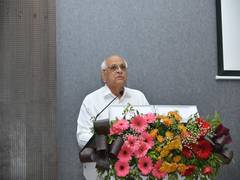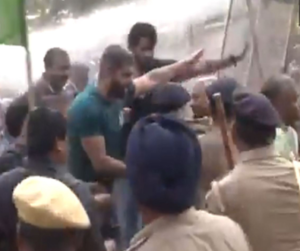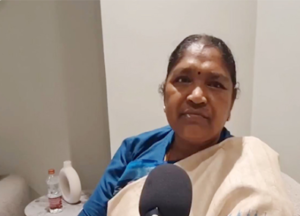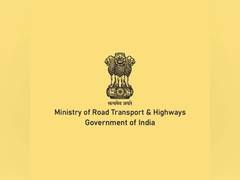‘He never use to talk about his Victoria Cross’: Lt Gen Bhagat’s daughter recalls his rich legacy
New Delhi, May 23 (PTI) Legendary army officer Lt Gen P S Bhagat was a Victoria Cross winner for his military peers and ‘Apna Sahib’ for the troops he commanded during his illustrious career, but for Ashali Varma he was more of an affectionate father who loved to have fun, and not a hard-nosed general.
Today marks the 49th death anniversary of Lt Gen Bhagat, who was the first Indian officer to have won the coveted Victoria Cross during World War II, for an intrepid action that was described by his commanding officer as ‘the longest feat of continuous cold courage’.
In a video interview with PTI, Delhi-based Varma said he was an officer, a gentleman, and a tough taskmaster, but he never boasted about his military accomplishments at home.
“He died when I was just 22, so he was more my father… I knew very little about his military life, in fact, he never used to talk about the Victoria Cross, ever. He never told me how he got it. He said he shouldn’t have got it and people who died should have got it. He didn’t like to talk about it, he didn’t think he deserved it,” she said.
“It was from the archives that we got to know exactly how he won the Victoria Cross. And those days, it was written about also,” Varma told PTI.
Bhagat was born in October 1918 in Gorakhpur, Uttar Pradesh and was decorated with the Victoria Cross by the then Viceroy of India Lord Linlithgow in 1941 when he was a Second Lieutenant in the army. The decorated officer died on May 23, 1975.
According to Delhi-based defence think-tank United Service Institution of India (USI), Bhagat was commissioned into the British Indian Army on July 15, 1939, as a Second Lieutenant in the Royal Bombay Sappers and Miners and later posted to the 21 Field Company of Engineers at Pune in September, shortly after the war began in Europe.
The Bombay Sappers has established ‘Lt Gen P S Bhagat, Annual Memorial Lecture’ at the USI in 2022, and recently the second lecture was delivered at an event in Delhi that was attended by Army Chief Gen Manoj Pande, many former army chiefs, and the late general’s daughter, among others.
Two huge posters were also mounted in the lobby of Manekshaw Centre bearing archival images of Bhagat, and his civil-military life. A portion carried a long note reproduced from the War Office dated June 10, 1941, which described his heroic deed for which he was awarded the Victoria Cross.
“Gen Bhagat cleared minefields under enemy fire, encountered mine explosions thrice and suffered an ear drum puncture, yet he executed his task relentlessly for 96 hours. This is what the Victoria Cross awardee was made of. Indeed, a true epitome of raw courage and robust junior leadership,” the Army chief said in his address during the event.
His genuine concern and commitment to the well-being of soldiers endeared him profoundly to the men he led and earned him the title of ‘Apna Sahib’, as the men respectfully called him, Gen Pande said.
Varma said, that at home, she saw him as a father and never saw the general in him.
“He used to get along better with the younger officers than the senior officers. It was like a family, wherever he went. He made them very comfortable. So, I grew up, having young officers coming to the house to meet him and all that. So, I didn’t think he was like a real commanding general or anything,” she recalled.
Asked what has been her fondest memory of his professional life, a proud Varma, said, “One of my fondest memories, I wrote about it, is when we went to England and met the Queen… we realised he was there with the who’s who of the world. Because we were meeting VCs (VC winners) from all across the world. We had a thing in Buckingham Palace. So, I think that was the time I really thought, ‘he is something’.”
Varma, who was about 15 years old then, reminisced that VC awardees from India, Australia, New Zealand, and England, among other countries, and two people of the families each were invited to the occasion.
She authored ‘The Victoria Cross: A Love Story: The Life of Lt Gen P S Bhagat’, a chronicle of the love story of her parents later, the research for which also took her to the Nehru Memorial Museum and Library in Delhi and the British Library in London.
“I think, my book says it all. Because that was a very personal book that I wrote. I did a lot of… five-year research on it. So, that is something I leave for my next generation.”
And while Bhagat’s tales of valour have been institutionalised through memorials and a lecture series, for Varma, his father was an officer who was “very low-keyed, but at the same time, he loved to have fun”.
“And, I remember him once, dancing to the tune of ‘Dum Maro Dum’… after the movie (‘Hare Rama Hare Krishna’) came out. It was in some (military) Mess, and I remember, he was dancing to it. Maybe there were other people, but he did all the moves… He loved Hindi songs. We used to play them all the time,” she recalled.
In July 1974, he became Chairman of the Damodar Valley Corporation (DVC), and transformed the public sector firm, earning admiration from its staff.
“After his death, when his cortege was moving through the premises of the DVC office, a ‘darban’ came up and said, ‘he may have been a general for others, but for us, he was a God’. That was the kind of love and affection he got from people,” Varma said.
Asked how she remembers his father on the death anniversary day every year, she said, “I do a little prayer and I do things he would enjoy… me doing.”






